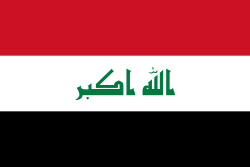| Iraq at the 2014 Asian Beach Games | |
|---|---|
 | |
| IOC code | IRQ |
| NOC | National Olympic Committee of Iraq |
| in Phuket | |
| Medals Ranked 29th |
|
| Asian Beach Games appearances | |
Iraq participated in the 2014 Asian Beach Games in Phuket, Thailand from 14 to 23 November 2014.
| Iraq at the 2014 Asian Beach Games | |
|---|---|
 | |
| IOC code | IRQ |
| NOC | National Olympic Committee of Iraq |
| in Phuket | |
| Medals Ranked 29th |
|
| Asian Beach Games appearances | |
Iraq participated in the 2014 Asian Beach Games in Phuket, Thailand from 14 to 23 November 2014.
| Medals by sport | ||||
|---|---|---|---|---|
| Sport | Total | |||
| | 0 | 2 | 2 | 4 |
| | 0 | 0 | 1 | 1 |
| Total | 0 | 2 | 3 | 5 |
| Medals by date | |||||
|---|---|---|---|---|---|
| Day | Date | Total | |||
| –1 | 12 Nov | 0 | 0 | 1 | 1 |
| 0 | 13 Nov | 0 | 0 | 0 | 0 |
| 1 | 14 Nov | 0 | 0 | 0 | 0 |
| 2 | 15 Nov | 0 | 0 | 0 | 0 |
| 3 | 16 Nov | 0 | 0 | 0 | 0 |
| 4 | 17 Nov | 0 | 0 | 0 | 0 |
| 5 | 18 Nov | 0 | 0 | 0 | 0 |
| 6 | 19 Nov | 0 | 0 | 0 | 0 |
| 7 | 20 Nov | 0 | 0 | 0 | 0 |
| 8 | 21 Nov | 0 | 0 | 2 | 2 |
| 9 | 22 Nov | 0 | 2 | 0 | 2 |
| 10 | 23 Nov | 0 | 0 | 0 | 0 |
| Total | 0 | 2 | 3 | 5 | |